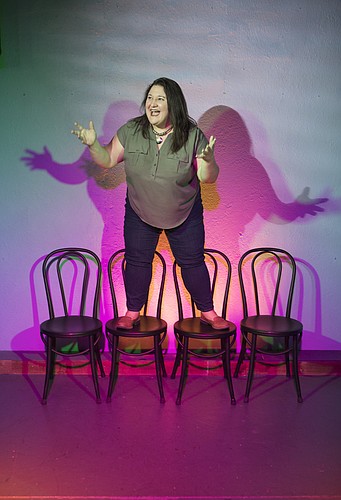- December 20, 2024
-
-
Loading

Loading

The idea for lawyers to do improv — and in doing so create a new business opportunity for an enterprising attorney — came together organically.
From 2009 to 2017, attorney Jennifer Strouf worked at the Hillsborough County Public Defender’s office, where part of her responsibilities included running training sessions. “I’ve always tried to work with very interactive methods of teaching,” she says.
Strouf noticed attorneys got quicker at objections after she started incorporating improv games into the training.
Then, last December, Strouf began performing improv at the Spitfire Theater in St. Petersburg. When a law firm contacted the theater about doing an improv team-building event, Strouf offered to help.
She wrote down her ideas and activities she’d done with lawyers. She quickly realized she’d almost developed an entire curriculum. Strouf says, “I started going, ‘Wait a second. Why am I not doing this?’”
Strouf seized the moment: she formed Improv4Lawyers, an educational consulting firm focused on helping attorneys improve their skills — in and out of the courtroom — through improvisation techniques.
Strouf has a law office in Clearwater and is a Florida Bar board certified criminal trial attorney. She also regularly performs in improv shows in the Tampa area and is a member of three improv teams.
When Strouf started Improv4Lawyers, she began researching applied improvisation — using improv for areas other than comedy. “Of course, being a lawyer, I researched the heck out of everything,” she says. Corporate uses for improv are big in Asia and Europe, she discovered.
“They seem like games, and they seem like fun, but they serve a real purpose.” — Jennifer Strouf, founder, Improv4Lawyers
Her research also discovered few attorneys offered improv classes for lawyers — which gave her an opportunity in an untapped market.
Her biggest challenge? Getting lawyers to buy into the non-traditional way of learning. While continuing education isn’t unique, the concept of using improv to accomplish legal continuing education is unusual. “A lot of them, that I’ve attended at least, are basically lecture hall things,” Strouf says. “There are very few interactive CLEs.”
That’s a big sell for her classes — they count toward continuing education courses lawyers must take, known as CLEs, continuing legal education.
To meet the challenge of getting lawyers to understand her classes and how they can benefit from them, Strouf has relied primarily on word of mouth from attorneys who have taken the sessions.
Jovita Kravitz, a personal injury attorney in Brandon and St. Petersburg, for example, took Strouf’s trial skills class in April. “Her techniques have helped me gain more focus, be less nervous and speak on my feet more,” Kravitz says. “I’ve recommended the class to many, many colleagues.”
The class also helped with opening arguments by teaching her to incorporate storytelling techniques. Now Kravitz uses elements like the weather and how her clients were feeling in statements. “This class was informal and fun and very interactive,” she says.
Strouf’s trial skills class is taught as a four-week class, one night a week for two hours. It costs $295. Despite the name, it’s not just for trial attorneys. “I assumed I was only going to have litigators,” Strouf says, but a variety of transactional attorneys have also taken it. “I was surprised by the broad base of law they practiced. Each got something out of it, whether it was confidence, listening or reduced stress or anxiety.”
Improv4Lawyers’ team-building class, meanwhile, is designed for people within the same law firm or organization to take together. It focuses on listening and accepting information, aiming to improve group communication. Teaching more classes for law firms is one way Strouf hopes to expand her clientele.
Right now, Strouf is the only instructor. But she might bring in another person with trial and improv skills to help as Improv4Lawyers grows. She declines to disclose revenues of the business so far.
With thousands of lawyers in the Tampa area, a lot of market remains open, Strouf says. “I think every one of those lawyers could benefit from Improv4Lawyers,” she says.
Strouf wants to teach Improv4Lawyers classes in other U.S. cities, too. To start, she’s targeting what she calls “improv-friendly cities” — Boston, Austin and Philadelphia.
There she plans to teach one-day classes on active listening, how to narrow down thoughts to key components and how to build thoughts into legal arguments. “It’s so much more than comedy,” Strouf says. “They seem like games, and they seem like fun, but they serve a real purpose.”